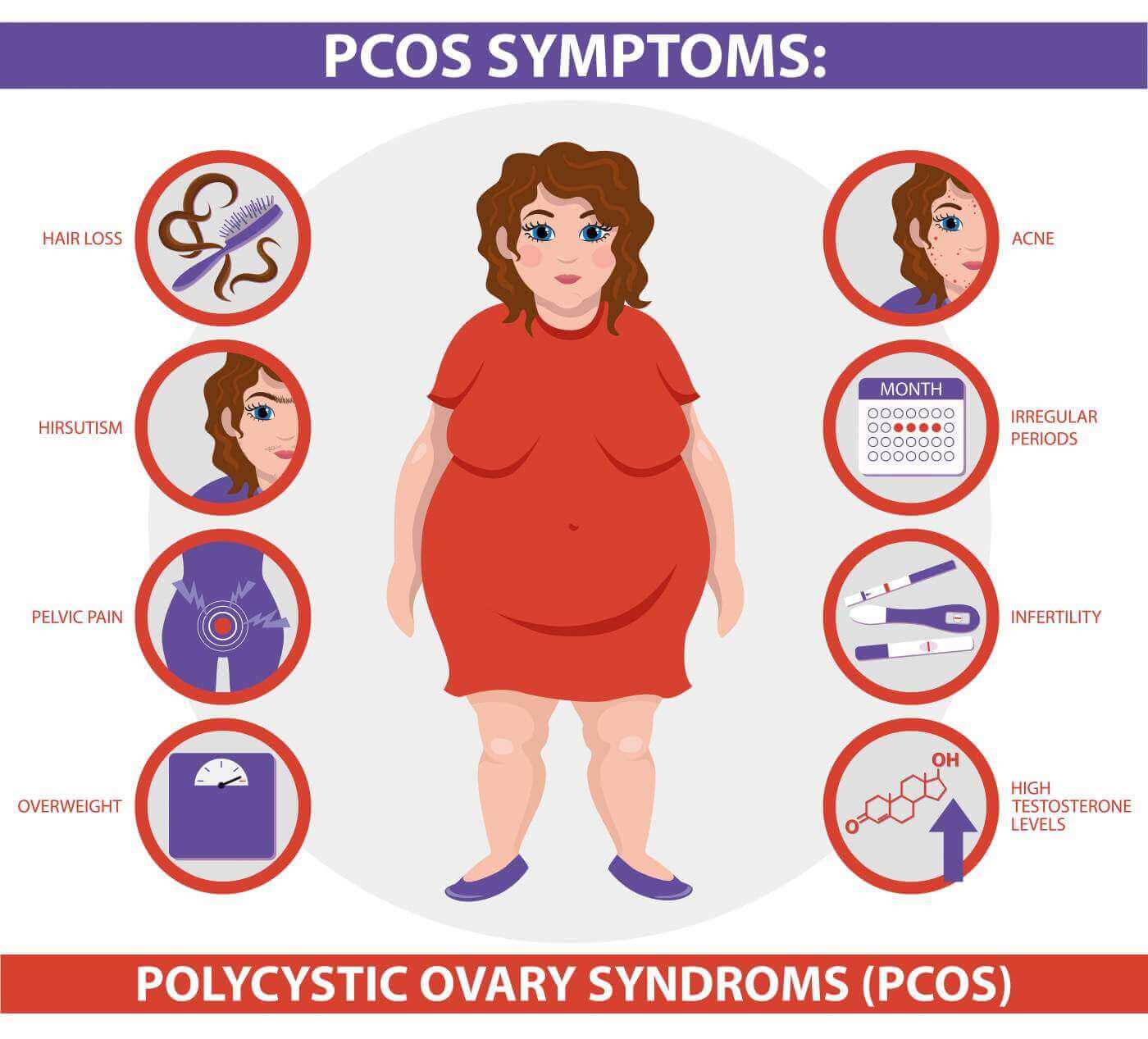Polycystic ovary syndrome (PCOS) is the most common hormonal disease that affects women. It is one of the main causes for infertility. Women with PCOS are at increased risk of diabetes and cardiovascular disorders. Women with PCOS are present with obesity, amenorrhea , oligomenorrhea and infertility. PCOS can be managed with herbal formulations as they help in regulating hormonal level . Sedentary lifestyle, anxiety and stress worsens the prognosis. PCOS can be managed by Ayurvedic formulations with some lifestyle modifications and by following a strict diet.
Introduction
PCOS (polycystic ovary syndrome) or PCOD (polycystic ovary disease)
It is a hormonal disorder caused by hormonal imbalance in women of reproductive age. This causes irregular periods, acne and hirsutism in women. It can be mild or severe.
Causes of PCOS or PCOD
 The exact cause of PCOS or PCOD is not known. But there are some factors which may respond to cause this disease.
The exact cause of PCOS or PCOD is not known. But there are some factors which may respond to cause this disease.
- Genetic Factors: PCOS can be hereditary, women who also had PCOS are more likely to have the disease.
- Excess testosterone: Increase the amount of testosterone in women can cause PCOS. The ovaries abnormally produce high levels of testosterone which results in hirsutism and acne.
- Insulin resistance: Insulin resistance occurs when the body’s cells are unable to use insulin properly and demand more insulin. The pancreas produces more insulin to compensate but this extra insulin amount triggers the ovaries to produce more testosterone. This can cause PCOS.
- Hormonal imbalance: Imbalance in hormones causes PCOS. When the levels of luteinizing hormone (LH) and insulin are very high, it causes the ovaries to produce an excess amount of testosterone, resulting in PCOS.
- Dietary factors: Our diet also increases the risk of PCOS. Food such as white bread, muffins, sugary snacks, drinks, inflammatory foods (processed and red meats).
Health risks associated with PCOS or PCOD
There are many health risks which are associated with PCOS.
It includes:
- Hypothyroidism
- High blood pressure
- Type 2 diabetes
- Liver disease
- Abnormal uterine bleeding
- Mood disorders
- Sleep apnea, etc.
Symptoms of PCOS or PCOD
 The signs and symptoms of PCOS may vary from person to person. Along with presence of cyst in uterus there are following symptoms that are present in PCOS –
The signs and symptoms of PCOS may vary from person to person. Along with presence of cyst in uterus there are following symptoms that are present in PCOS –
- Excessive weight gain
- Acne and pimple
- Excessive and unwanted hair growth on face and body
- Thinning of scalp hair
- Darkening of the skin
- Depression and anxiety
- Headache
- Infertility
- Deep voice
- Reduction in breast size
- Pelvic pain
Natural Treatment of PCOS or PCOD
Ayurveda offers various herbs, panchakarma, and has also recommended some yoga asanas for natural treatment of PCOS or PCOD. Herbs are also used to prepare herbal medicines.
Ayurvedic herbs for PCOS or PCOD
1. Ashwagandha ( Withania somnifera)
This herb is very effective in the treatment of PCOS. It is a natural stress reliever and promotes the nervous system. It helps in balancing the levels of cortisol, which can improve stress and symptoms associated with PCOS.
(Bhava Prakasha Nighantu/ Guduchyadi Varga/ Shloka no. 190)
This Shloka explains the use of Ashwagandha. It is widely used in the treatment of anxiety, skin disorder, depression, chronic and adrenal fatigue, and swelling. It also improves blood circulation. It is a very good antioxidant, acts as a nervous tonic and soothes nerves. Hence it is useful to relieve numbness. Ashwagandha improves quality and quantity of sperm count.
2. Cinnamon
Cinnamon is very useful in regularizing menstruation in women with PCOS and also reduces menstrual cramps. It also shows positive effects by reducing insulin resistance.
3. Chasteberry (Vitex agnus)
Chaste berry is very useful in reproductive conditions and good for women who have missing or irregular periods. It helps to stimulate and support the functioning of the pituitary gland, thus known as an effective herb to treat PCOS.
4. Turmeric (Curcuma longa)
Turmeric is known for its strong healing function. It is an anti-inflammatory herb and also reduces insulin resistance.
5. Berberine
Berberine helps to stimulate metabolism and also balance the function of the endocrine system. Thus is helpful in PCOS.
6. Holy basil or Tulsi
It helps in reducing metabolic stress. It also lowers blood sugar and cortisol levels.
7. Licorice root
It helps in lowering blood sugar levels and balancing the levels of hormones in the body. It acquires an anti-inflammatory property.
8. Maca
It acts as a natural energy booster and hormone balancer. It supports a healthy menstrual cycle by balancing the estrogen and progesterone in the body. It also reduces depression. This herb is very effective in PCOS.
9. Saw palmetto
This herb helps to balance hormone levels in the body. It lowers testosterone levels and also has anti-estrogenic effects. Thus, it is very effective for women with PCOS.
10. Dandelion Root
This herb acts as a powerful liver detoxifier and bile flow stimulant. It supports a healthy menstrual cycle and is helpful in the treatment of PCOS.
Panchkarma for PCOS or PCOD
Panchakarma is a purification therapy that is used in Ayurveda to restore and purify the body, mind, and emotions. This therapy is used in the treatment of various health conditions. There is an imbalance of vata and kapha dosha in PCOD. Some Panchakarma therapies are used to treat PCOS:
- Vamana
- Virechana
- Basti
1. Vamana
In this process, the medicines are administered orally to induce vomiting. This will help flush out the toxins from the body. Basically it acts on Pitta dosha in the body.
2. Virechana
In this process, the medicines are administered orally to induce purgation. This will help flush out the toxins from the body. It acts on Kapha dosha in the body.
3. Basti
In this process, medicines are given in the form of enena. It calms Tridosha in the body but mainly acts on Vata dosha in the body. Basti nourishes the reproductive system and also helps in its detoxification. It is highly recommended therapy in PCOS.
Yoga Asana for PCOS or PCOD
Yoga helps to reduce stress, calm the mind and manage balance in the body. Yoga asanas open up the pelvic area and increase relaxation, which helps in the treatment of Polycystic ovary syndrome (PCOS).
It includes:
- Shavasana (Corpse Pose)
- Padmasana (Lotus Pose)
- Balasana (Child’s Pose)
- Dhanurasana (Bow Pose)
- Naukasana (Boat Pose)
- Supta Badhakonasana
- Bharadvajasana
- Chakki Chalanasana
Dietary guidelines for PCOS or PCOD
Food to be taken
1. Iron-rich foods
In PCOS some women may experience heavy bleeding during their period. This can lead to iron deficiency or anemia. At that time after consulting the doctor, she can take iron-rich food such as spinach, eggs, and broccoli, etc.
2. Add whole foods in your diet
Whole grains, vegetables, fruits, and legumes are whole foods that you can include in your diet.
- Whole grains – Wheat, bulgur wheat, quinoa, rolled oats, and barley.
- Legumes – Kidney beans, lima beans, lentils, chickpeas, and split peas.
- Fruits– Spinach, potatoes, cauliflower, carrot, broccoli, and cabbage, etc.
- Vegetables – Papaya, pineapple, avocado, cherries, strawberries, figs, apples, and mango, etc.
3. Anti-inflammatory food
Olive oil, tomatoes, leafy greens, fatty fish like salmon, mackerel and tuna, fruits such as strawberries and blueberries, and tree nuts
4. Magnesium-rich foods
Almonds, cashews, legumes, tofu, spinach, and bananas.
Food to be avoid
- Avoid overcooked vegetables
- Caffeine products like coffee, chocolate
- Processed and frozen Food
- Red meat, dark meat poultry, and turkey
Conclusion –
It is concluded that Ayurvedic treatment including Shodhna and Shaman helped in improving ovulation, ovum quality. Weight reduction associated with PCOS can be managed by Ayurvedic medicines. Hence PCOS can be managed with herbal formulations, Panchkarma and regular yoga due to its holistic approach.
Author Bio –
Dr. Vikram Chauhan (MD-Ayurveda) is an expert Ayurvedic Doctor based in Chandigarh, India and doing his practice in Mohali, India. He is spreading the knowledge of Ayurveda – Ancient healing treatment, not only in India but also abroad. He is the CEO and Founder of Planet Ayurveda Products, Planet Ayurveda Clinic, and Krishna Herbal Company. For more info visit our website: www.planetayurveda.com
